California's security guard background check process, administered by the Bureau of Security and Investigative Services (BSIS), requires comprehensive criminal history verification through DOJ and FBI databases. Processing times average 60-90 days for armed guards and 30-45 days for unarmed positions. Understanding BSIS disqualifying offenses, documentation requirements, and compliance protocols is essential for job seekers and employers navigating California's stringent security licensing standards.
Key Takeaways
- California security guards must complete BSIS-approved background checks through both DOJ (Department of Justice) and FBI databases before receiving Guard Card authorization.
- The background check process typically takes 30-45 days for unarmed guards and 60-90 days for armed security positions, with expedited processing unavailable.
- Disqualifying offenses include felony convictions, violent crimes, weapons-related offenses, and certain misdemeanors within the past seven years, though appeals are possible.
- Armed security guards face additional scrutiny including psychological evaluations, firearms qualification courses, and expanded criminal history reviews.
- BSIS application fees range from $55 for unarmed Guard Cards to $100+ for armed licenses, with fingerprinting costs adding $32-75 depending on the processing method.
- California does not offer reciprocity with other states, requiring all security guards to complete full BSIS licensing regardless of out-of-state credentials.
- Employers must verify active BSIS licenses through the official online database and maintain documentation for FCRA compliance during the hiring process.
- Certain misdemeanors and felonies may become eligible for consideration after 5-10 years, depending on the offense category and rehabilitation evidence.
- The BSIS appeals process allows applicants to challenge denials by providing court documents, character references, and evidence of rehabilitation.
California Security Guard Industry Overview
California employs over 180,000 licensed security guards as of 2025, making it the largest security workforce in the United States. The industry is strictly regulated by the Bureau of Security and Investigative Services (BSIS), a division of the California Department of Consumer Affairs. BSIS oversees licensing, training standards, and compliance enforcement across all security sectors.
Security guards in California work across diverse industries including corporate campuses, retail establishments, healthcare facilities, entertainment venues, and residential communities. The California security industry generates approximately $8.4 billion in annual revenue. Projected growth of 6-8% through 2027 reflects increasing demand for private security services throughout the state.
BSIS regulations mandate that all security guards complete background checks, training requirements, and obtain proper licensing before beginning employment. These compliance requirements protect public safety while maintaining professional standards. Understanding these regulations is critical for both aspiring security professionals and employers seeking to maintain legal operations.
BSIS Licensing Requirements Deep-Dive
Guard Card Application Process
The California Guard Card, officially called the Security Guard Registration, is the foundational credential required for all security personnel working in the state. Applicants must be at least 18 years old, complete a 40-hour Power to Arrest training course, and submit a BSIS application with fingerprints for criminal background screening. The application process begins with enrolling in a BSIS-approved training program.
Training courses cover legal authority, public relations, emergency procedures, and professional conduct standards. Once training is completed, applicants submit Form BSIS 100A (Guard Card Application) along with proof of training completion, fingerprint images through Live Scan technology, and the required fees. BSIS reviews the application materials, initiates the background check through DOJ and FBI databases, and processes the Guard Card within 30-45 days for qualified applicants.
Training Requirements and Certification
California requires security guards to complete specific training hours before and after receiving their Guard Card authorization. The initial 40-hour Power to Arrest course must be completed through a BSIS-licensed training provider and includes both classroom instruction and practical skills assessment. This comprehensive training ensures security personnel understand their legal authority and professional responsibilities.
The training requirements include:
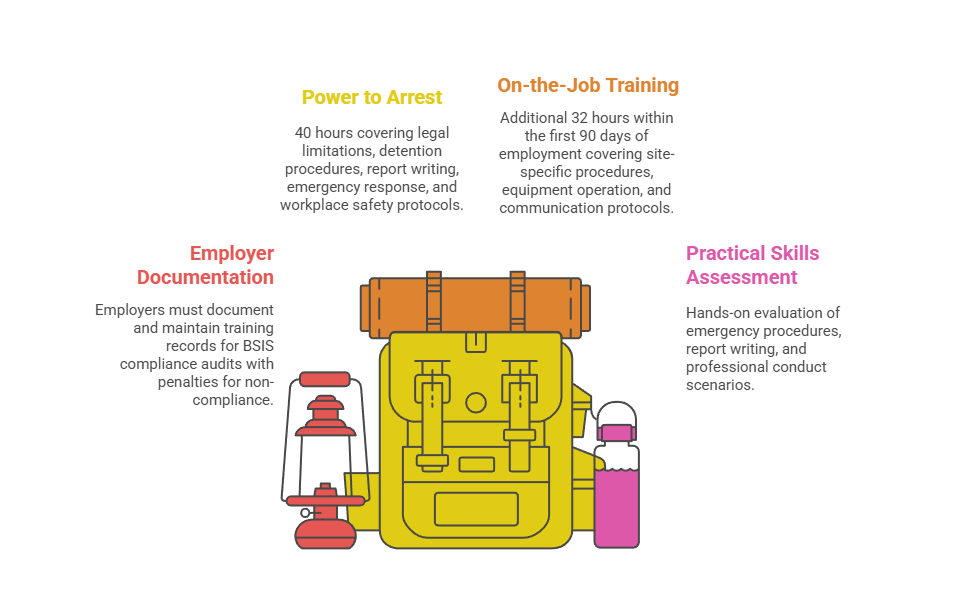
- Power to Arrest Course: 40 hours covering legal limitations, detention procedures, report writing, emergency response, and workplace safety protocols before receiving a Guard Card.
- On-the-Job Training: Additional 32 hours within the first 90 days of employment covering site-specific procedures, equipment operation, and communication protocols.
- Employer Documentation: Employers must document and maintain training records for BSIS compliance audits with penalties for non-compliance.
- Practical Skills Assessment: Hands-on evaluation of emergency procedures, report writing, and professional conduct scenarios.
Security professionals must meet these training standards to maintain compliance with California regulations. Employers are responsible for ensuring their security staff complete required training within specified timeframes.
Renewal and Continuing Education
Guard Card renewal occurs every two years and requires 8 hours of continuing education covering legal updates, de-escalation techniques, and professional development topics. Renewal applications must be submitted 60 days before expiration to avoid gaps in licensure. Background checks are repeated during each renewal cycle to ensure continued eligibility.
BSIS has implemented online renewal systems as of 2024, streamlining the process and reducing processing times to 14-21 days for renewal applications. Security professionals who allow their Guard Cards to lapse face reinstatement requirements including repeat training and extended background check timelines. The cost of maintaining active licensure includes $55 renewal fees, continuing education course costs averaging $75-150, and fingerprint processing fees for background updates.
Background Check Components and Timeline
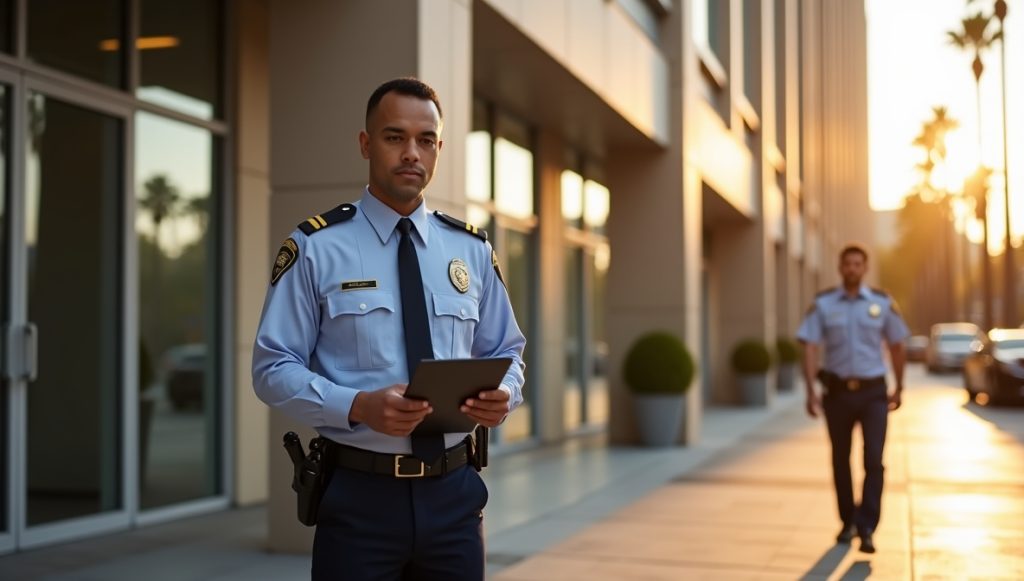
Criminal History Database Searches
The BSIS background check process searches multiple criminal history databases to ensure comprehensive screening of security guard applicants. The California Department of Justice (DOJ) database contains state-level arrest records, court dispositions, and conviction histories across all 58 California counties. FBI databases provide national-level criminal records including arrests, convictions, and outstanding warrants from federal and interstate sources.
Live Scan fingerprinting technology captures digital fingerprint images and transmits them electronically to DOJ and FBI repositories for automated matching. This process typically generates initial results within 24-72 hours. However, comprehensive review and disposition verification can extend timelines significantly as BSIS examiners manually review flagged records.
Additional database searches include sex offender registries, terrorist watch lists, and mental health adjudications related to firearms prohibitions. For armed guard applicants, BSIS also verifies eligibility through the California Firearms Application Reporting System (CFARS) and federal NICS (National Instant Criminal Background Check System) databases. This multi-layered screening ensures comprehensive risk assessment before authorization is granted.
Processing Timelines by License Type
Background check processing timelines vary based on the license type, applicant history, and BSIS workload volumes. Standard unarmed Guard Card applications process within 30-45 days assuming no criminal history flags or documentation issues. Applications with prior arrests or out-of-state records require additional verification and extend timelines to 60-90 days or longer.
| License Type | Average Processing Time | Factors Affecting Timeline |
| Unarmed Guard Card | 30-45 days | Clean record, California resident, complete documentation |
| Armed Guard License | 60-90 days | Firearms qualification, expanded criminal review, psychological evaluation |
| Security Company License | 90-120 days | Corporate documentation, principal background checks, financial verification |
Armed security guard applications face extended timelines due to additional requirements including firearms qualifications, psychological evaluations, and expanded criminal history reviews. Peak application periods including summer months and January can add 2-3 weeks to standard processing timelines due to increased volume.
Status Tracking and Communication
BSIS provides online application tracking through the BSIS Online Services portal where applicants can monitor their application status in real-time. Status updates include "Received," "Under Review," "Fingerprints Processed," "Background Check in Progress," and "Approved/Denied." Applicants receive email notifications at key milestones, though proactive checking is recommended.
For applications exceeding standard processing timelines, applicants can contact BSIS Licensing Services directly at (916) 322-4000 or submit inquiries through the online portal. BSIS staff cannot expedite processing but can identify missing documentation or errors causing delays. Understanding that background check timelines are largely dependent on external agencies helps manage expectations during the waiting period.
Disqualifying Factors and Appeals Process
Automatic Disqualifying Offenses
California law establishes specific criminal offenses that automatically disqualify individuals from security guard licensure under Business and Professions Code Section 7583.9. These disqualifying offenses are categorized by severity and timeframe. Some create permanent bars while others allow consideration after specified waiting periods.
Permanent disqualifying offenses include murder or voluntary manslaughter, sexual offenses requiring registration under Penal Code 290, and kidnapping with intent to harm. Seven-year disqualifying offenses include most felony convictions and serious misdemeanors such as assault with a deadly weapon, domestic violence, burglary, grand theft, and weapons violations. After seven years from conviction or release from incarceration (whichever is later), applicants may petition for consideration based on rehabilitation evidence.
BSIS reviews these petitions individually, weighing public safety concerns against evidence of personal reform and character references. Understanding these categories helps applicants assess their eligibility before investing time and money in the application process. According to Sarah Martinez, a California security licensing attorney with 15 years of experience, "BSIS increasingly considers rehabilitation evidence including employment history, community involvement, and character references when evaluating borderline cases."
Conditional Disqualifiers and Mitigating Factors
Certain criminal convictions create conditional disqualification where BSIS exercises discretionary review based on case-specific circumstances. Misdemeanor convictions over seven years old, dismissed charges, juvenile offenses, and expunged records may receive favorable consideration depending on the nature of the offense and subsequent conduct. BSIS considers the relationship between past offenses and security guard duties when evaluating these applications.
Mitigating factors that strengthen eligibility arguments include:
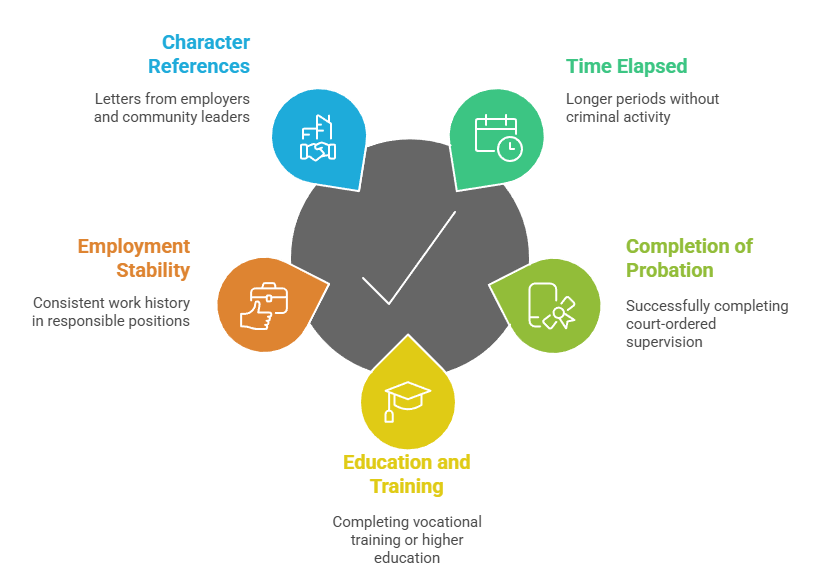
- Time elapsed since offense: Longer periods without criminal activity demonstrate sustained rehabilitation and reduced recidivism risk.
- Completion of probation/parole: Successfully completing court-ordered supervision shows compliance with legal obligations.
- Education and training: Completing vocational training, higher education, or professional certifications demonstrates commitment to legitimate career paths.
- Employment stability: Consistent work history in responsible positions indicates reliability and trustworthiness.
- Character references: Letters from employers, community leaders, and counselors provide third-party validation of rehabilitation.
Demonstrating understanding of how past mistakes relate to security responsibilities shows maturity valued by licensing authorities. Applicants with conditional disqualifiers should focus on building comprehensive evidence packages that address public safety concerns.
Appeals Process and Legal Options
Applicants denied BSIS licensure due to criminal history receive written notification detailing the specific disqualifying offenses and their right to appeal. The appeals process begins with submitting a written statement explaining the circumstances of the conviction, evidence of rehabilitation, and reasons BSIS should reconsider the denial. Supporting documentation should include certified court records, character reference letters, proof of completed counseling programs, and employment verification letters.
The formal appeals process involves initial reconsideration request submission within 30 days of denial notice, BSIS review of submitted materials, administrative hearing before an Administrative Law Judge if needed, and final agency decision subject to court appeal. Legal representation significantly improves appeal success rates, particularly for complex cases involving multiple offenses. California security licensing attorneys understand BSIS precedents and know what evidence carries weight with examiners.
Armed Guard Additional Requirements
Firearms Qualification and Training
Armed security guards in California face substantially more rigorous requirements than their unarmed counterparts. The BSIS-approved Firearms Training Course consists of 14 hours covering firearms safety, legal use of force, weapons retention, marksmanship fundamentals, and scenario-based decision-making exercises. Applicants must demonstrate proficiency with the specific firearm types they will carry on duty.
Qualification courses include live-fire exercises where applicants must achieve minimum accuracy scores at various distances under time constraints. Handgun qualification typically requires 48 out of 60 shots (80%) to hit designated target zones from distances of 3, 7, and 15 yards. Applicants who fail initial qualification may retake the course after additional practice, though training providers charge full fees for repeat attempts averaging $150-250 per course.
Psychological Evaluation Requirements
California requires armed security guard applicants to undergo psychological evaluations conducted by licensed psychologists approved by BSIS. These assessments determine whether candidates possess the emotional stability and judgment required for carrying firearms in public settings. The evaluation process is mandatory for all armed guard applicants and significantly impacts processing timelines.
The psychological evaluation includes:
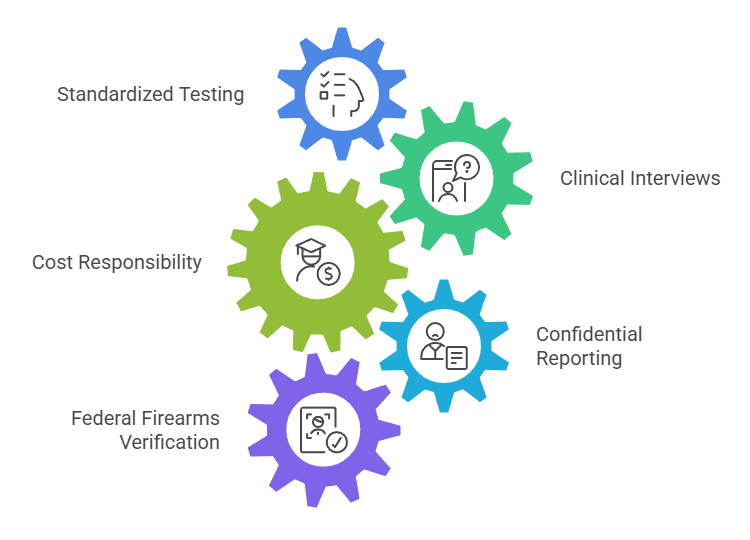
- Standardized Testing: Psychological instruments assessing emotional stability, impulse control, and judgment under stress.
- Clinical Interviews: One-on-one sessions with licensed psychologists exploring mental health history and suitability for armed duties.
- Cost Responsibility: Applicants pay $200-400 depending on provider and location regardless of evaluation outcome.
- Confidential Reporting: Evaluators submit suitability determinations to BSIS without disclosing specific psychological details.
- Federal Firearms Verification: Background check includes confirmation that applicants meet federal eligibility standards under 18 U.S.C. § 922(g).
BSIS coordinates with the DOJ and FBI to ensure armed guard applicants pass both state and federal firearms eligibility screening. This comprehensive evaluation protects public safety by identifying candidates unsuitable for armed security positions.
Enhanced Criminal History Review
Armed security guard applications receive heightened scrutiny regarding criminal history. Offenses considered acceptable for unarmed positions may disqualify armed applicants due to elevated public safety concerns. BSIS examiners look closely at any history of violence, weapons violations, substance abuse, or incidents suggesting poor judgment.
The enhanced review examines not just convictions but also arrests, dismissed charges, and police contacts that might indicate patterns of concerning behavior. While arrest records alone cannot create automatic disqualification under California law, they may trigger additional investigation. Armed guard applicants should be prepared to provide detailed explanations of any criminal justice system contact.
| Requirement Category | Unarmed Guard | Armed Guard |
| Training Hours | 40 hours Power to Arrest | 40 hours + 14 hours Firearms Training |
| Background Check Depth | Standard DOJ/FBI search | Enhanced review with federal firearms eligibility |
| Medical/Psychological | None required | Psychological evaluation mandatory |
| Processing Timeline | 30-45 days | 60-90 days |
| Renewal Frequency | Every 2 years | Annually with firearms requalification |
| Total Licensing Cost | $150-250 | $500-750 |
Armed security positions also require annual firearms requalification and renewed eligibility verification, compared to two-year renewal cycles for unarmed guards. This ongoing scrutiny ensures armed personnel maintain proficiency throughout their careers.
Multi-State License Reciprocity
California does not recognize security guard licenses from other states, requiring all security personnel working in California to complete full BSIS licensing regardless of credentials earned elsewhere. This non-reciprocity policy reflects California's stringent standards and comprehensive regulatory framework, which often exceed requirements in other jurisdictions. Security professionals relocating to California must budget for complete relicensing processes and associated timelines.
The lack of reciprocity affects traveling security personnel, event security teams, and protection specialists who work across state lines. Out-of-state security companies contracting for California assignments must ensure their personnel obtain valid BSIS credentials before beginning work. While federal regulations allow certain exemptions for interstate armed transport under the Law Enforcement Officers Safety Act (LEOSA), these provisions don't override California's licensing requirements.
Security professionals with prior licensing in other states may face additional background check complexities when applying for California credentials. BSIS requires disclosure of all security licenses held in other jurisdictions and investigates any disciplinary actions, suspensions, or revocations from other states. Prior licensing issues create red flags that trigger enhanced scrutiny even if the underlying conduct wouldn't independently disqualify California applicants.
Employer Verification Best Practices
BSIS License Verification Systems
California employers hiring security guards must verify active BSIS licensure before allowing employees to begin work. Significant penalties for non-compliance include fines up to $5,000 per violation and potential license revocation for security companies. The BSIS Online Verification System provides real-time license status checking through the official BSIS website at www.bsis.ca.gov, allowing employers to search by name, license number, or company name.
Employers should implement systematic verification protocols:
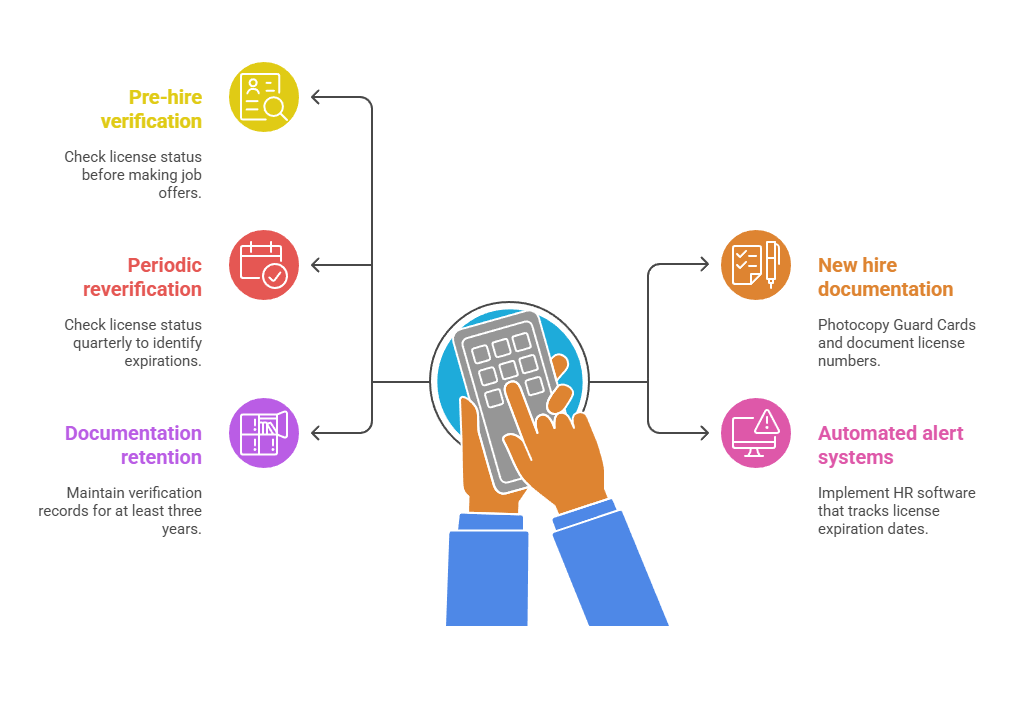
- Pre-hire verification: Check license status before making job offers to ensure candidates possess valid credentials.
- New hire documentation: Photocopy Guard Cards and document license numbers in personnel files for audit compliance.
- Periodic reverification: Check license status quarterly to identify expirations before they occur and ensure continued compliance.
- Automated alert systems: Implement HR software that tracks license expiration dates and generates renewal reminders 60 days in advance.
- Documentation retention: Maintain verification records for at least three years to demonstrate due diligence during potential audits.
BSIS conducts compliance audits of security companies and client organizations employing security guards. Companies found employing unlicensed guards face administrative penalties, potential civil litigation exposure, and insurance coverage issues if incidents occur.
FCRA Compliance and Background Screening
Employers conducting independent background checks beyond BSIS verification must comply with the Fair Credit Reporting Act (FCRA) and California's Consumer Credit Reporting Agencies Act (CCRAA). These regulations require specific disclosures, applicant authorization, and adverse action procedures when using consumer reports for employment decisions. Even though BSIS conducts comprehensive criminal background checks, employers may wish to perform additional screening for employment gaps, reference verification, or credit history for positions with financial responsibilities.
FCRA compliance requirements include clear disclosure in standalone documents, written authorization from applicants, pre-adverse action notice with copy of report, waiting period of 5-7 business days for dispute resolution, and final adverse action notice with contact information. California's "ban the box" legislation (AB 1008) prohibits employers from inquiring about criminal history on initial applications. Employers must conduct individualized assessments of criminal convictions before disqualifying candidates.
Record Retention and Audit Preparedness
Security employers must maintain comprehensive documentation demonstrating compliance with BSIS regulations, FCRA requirements, and California labor laws. Essential records include BSIS license verification documentation, training completion certificates, on-the-job training logs, firearms qualification records for armed guards, and insurance documentation. These records must be readily accessible for BSIS audits, workers' compensation investigations, and potential legal proceedings.
Recommended record retention timelines include BSIS license verifications for 3 years after employment termination, training documentation permanently for current employees and 5 years after termination, background check authorizations for 7 years under FCRA requirements, and payroll records for 4 years under California labor law. Digital document management systems improve compliance efficiency by centralizing records and automating retention schedules. Cloud-based solutions offer secure storage with access controls ensuring only authorized personnel can view sensitive information.
Conclusion
California's security guard background check process represents one of the most thorough licensing systems in the United States. It balances public safety concerns with opportunities for qualified individuals to enter the profession. Understanding BSIS requirements, disqualifying factors, and compliance obligations is essential for both aspiring security professionals and employers. While the process requires significant time investment and navigating complex regulations, proper preparation dramatically improves success rates and reduces processing delays.
Frequently Asked Questions
What disqualifies you from being a security guard in California?
Permanent disqualifying offenses include murder, manslaughter, sexual offenses requiring registration, and first-degree kidnapping. Most felony convictions and serious misdemeanors create seven-year disqualification periods from conviction or release date. Violent crimes, weapons violations, theft offenses, and domestic violence convictions raise significant concerns. Appeals with rehabilitation evidence may succeed after waiting periods expire.
How long does a BSIS background check take?
Standard unarmed Guard Card applications typically process within 30-45 days, while armed security guard applications require 60-90 days. Applications involving out-of-state criminal records or complex case histories may extend beyond 90 days. BSIS does not offer expedited processing regardless of employer urgency, so applicants should initiate the process well before anticipated employment start dates.
Can felons be security guards in California?
Felons may qualify for California security guard licenses after seven years from conviction or release from incarceration by providing substantial rehabilitation evidence. BSIS conducts case-by-case reviews considering offense nature, subsequent conduct, employment history, and character references. Certain serious felonies including murder, sexual offenses, and violent crimes create permanent bars. Applicants should consult with California security licensing attorneys to assess eligibility.
What does a California security guard background check include?
California's BSIS background check searches DOJ state criminal databases, FBI national records, sex offender registries, terrorist watch lists, and mental health adjudications. The process verifies identity through fingerprint analysis and reviews arrest records and court dispositions. Armed guard applications include additional federal firearms eligibility verification through NICS databases. BSIS manually reviews flagged records to determine eligibility based on current regulations.
How much does a BSIS license cost?
Initial unarmed Guard Card costs approximately $150-250 including the $55 BSIS application fee, $32-75 for Live Scan fingerprinting, and $40-100 for required training courses. Armed security guard licensing totals $500-750 including unarmed requirements plus $100 armed application fees, $150-250 for firearms training, and $200-400 for mandatory psychological evaluations. Biennial renewal costs approximately $55-100 plus continuing education fees of $75-150.
Do I need a new background check when renewing my Guard Card?
Yes, California requires complete background checks during each two-year Guard Card renewal cycle, including new fingerprint submissions and criminal history database searches. BSIS verifies that licensees continue meeting eligibility standards and haven't incurred disqualifying offenses since initial licensing. Renewal applications should be submitted 60 days before expiration. Criminal charges or convictions occurring between renewals must be disclosed.
How do I check if my security guard license is still active?
Verify license status through the BSIS Online Verification System at www.bsis.ca.gov by entering your name, license number, or company name. The system displays real-time status including active, expired, suspended, or revoked designations along with expiration dates. Both license holders and employers should verify status regularly. If discrepancies appear, contact BSIS Licensing Services at (916) 322-4000 immediately.
Can I work as a security guard while my background check is pending?
No, California law prohibits performing security guard duties without an active BSIS-issued Guard Card. Employers hiring unlicensed guards face penalties up to $5,000 per violation and potential license revocation. Some employers offer alternative positions such as customer service roles while background checks process. Applicants should avoid positions claiming they can "work under supervision" while licensing is pending.
What should I do if my BSIS application is denied?
Request a written explanation of the specific disqualifying factors from BSIS and evaluate whether grounds exist for appeal. Submit a reconsideration request within 30 days including court-certified records, rehabilitation evidence, and character references. Consider consulting a California security licensing attorney who can assess appeal prospects. If initial reconsideration fails, request an administrative hearing before an Administrative Law Judge.
Does California recognize security guard licenses from other states?
No, California does not offer reciprocity for out-of-state security guard licenses regardless of training or experience levels. All security personnel working in California must complete full BSIS licensing including California-specific training and background checks. Security professionals relocating from other states should initiate California licensing immediately. Processing timelines of 30-90 days can delay employment opportunities.
Additional Resources
- Bureau of Security and Investigative Services Official Website
https://www.bsis.ca.gov - California Business and Professions Code Section 7583.9 - Security Guard Disqualifications
https://leginfo.legislature.ca.gov/faces/codes_displaySection.xhtml?lawCode=BPC§ionNum=7583.9 - BSIS Online License Verification System
https://www.bsis.ca.gov/online_services/verify_lic.shtml - California Department of Justice - Live Scan Information
https://oag.ca.gov/fingerprints/locations - Federal Trade Commission - Fair Credit Reporting Act Guidance
https://www.ftc.gov/legal-library/browse/statutes/fair-credit-reporting-act - California Consumer Credit Reporting Agencies Act (CCRAA)
https://leginfo.legislature.ca.gov/faces/codes_displayText.xhtml?lawCode=CIV&division=3.&title=1.81.&part=4.&chapter=&article=
Still have questions?
Get in touch with our team today for a personalized demo and discover how our tailored volume pricing and packages can drive results for your business!
How useful was this page?*
Note: your comments are anonymous. We use them to improve the website. Do not include any personal details.
Visit our FCRA Compliance Tool or leave a message here if you need a response.
From the blog Explore the GCheck Content Hub

How Long Does a Background Check Take? A Complete 2025 Guide
13 Dec, 2023 • 14 min read
The Ultimate Background Check Guide
13 Dec, 2023 • 4 min read
The Ultimate Guide to Employment Background Checks
13 Dec, 2023 • 10 min readThe information provided in this article is for general informational and educational purposes only and should not be construed as legal advice or a substitute for consultation with qualified legal counsel. While we strive to ensure accuracy, employment screening laws and regulations—including but not limited to the Fair Credit Reporting Act (FCRA), Equal Employment Opportunity Commission (EEOC) guidelines, state and local ban-the-box laws, industry-specific requirements, and other applicable federal, state, and local statutes—are subject to frequent changes, varying interpretations, and jurisdiction-specific applications that may affect their implementation in your organization. Employers and screening decision-makers are solely responsible for ensuring their background check policies, procedures, and practices comply with all applicable laws and regulations relevant to their specific industry, location, and circumstances. We strongly recommend consulting with qualified employment law attorneys and compliance professionals before making hiring, tenant screening, or other decisions based on background check information.

